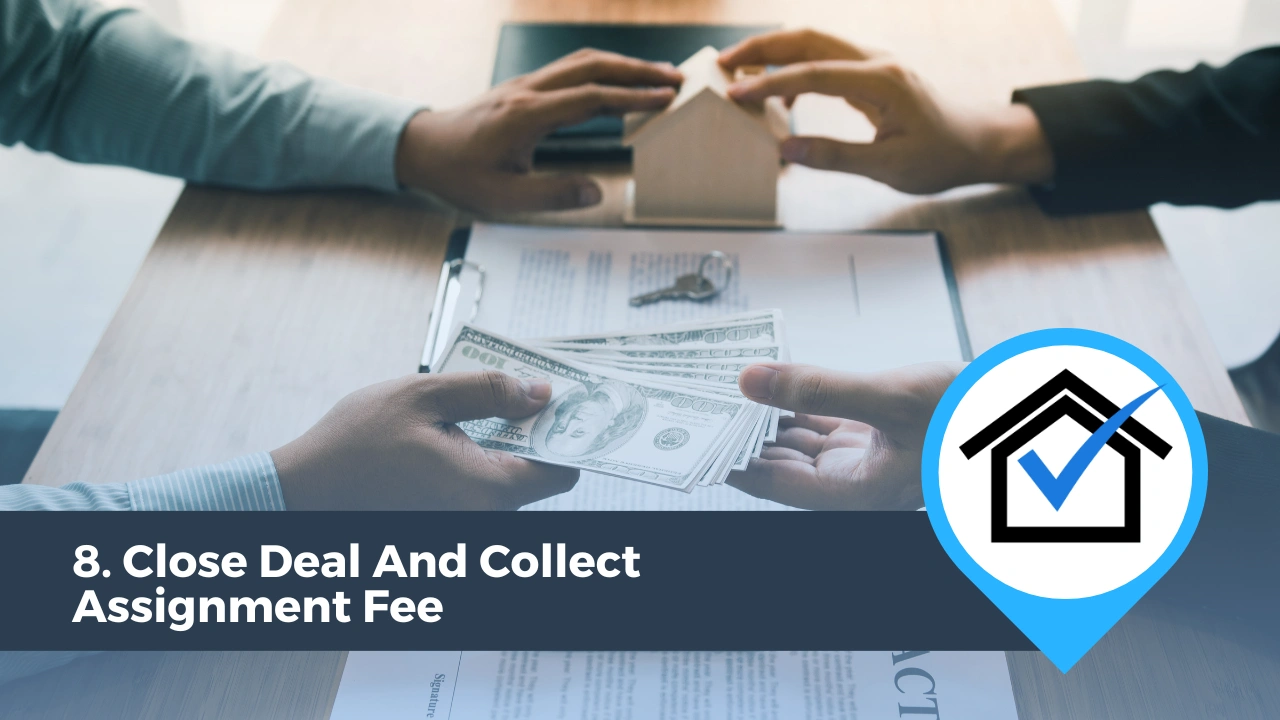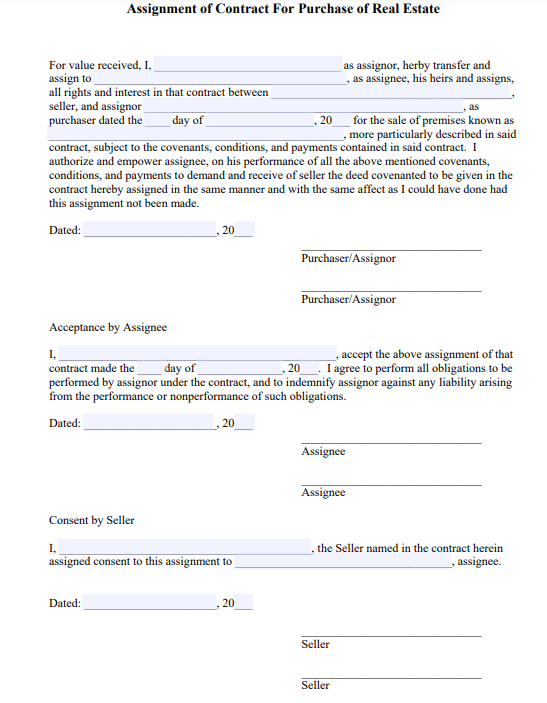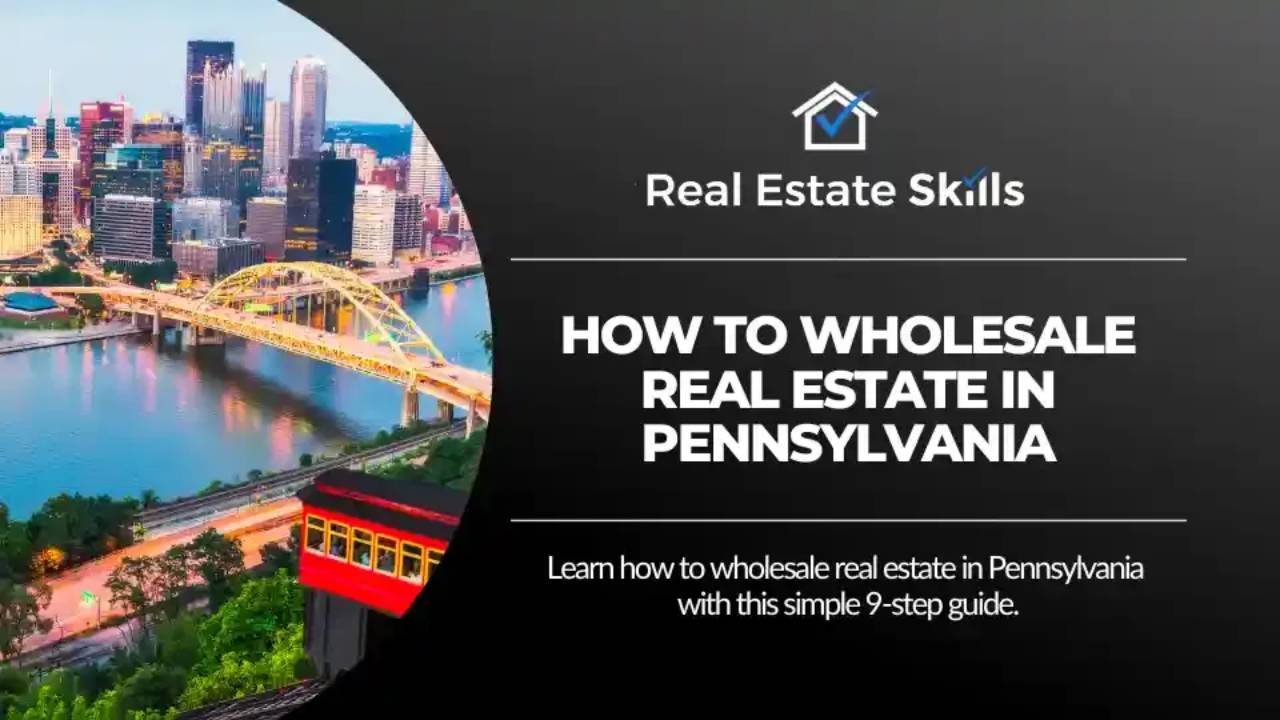
How To Wholesale Real Estate In Pennsylvania: Step-By-Step (2026)
Dec 01, 2025
What: Wholesaling real estate in Pennsylvania means finding discounted or off-market properties, securing them under contract, and then assigning those contracts to cash buyers for a profit—without purchasing or renovating the property yourself.
Why: It can be a lucrative investment strategy because Pennsylvania’s active housing markets offer ample opportunities for motivated sellers and real estate investors. Wholesaling enables you to generate income, build your network, and gain experience with limited capital.
How: Follow the steps in this article: understand Pennsylvania’s wholesaling rules and licensing requirements, build a cash‐buyers list, find motivated sellers, run accurate deal analysis (ARV, MAO), secure legally sound contracts, assign the contracts to end-buyers, and close your wholesale transaction successfully.
What does it take to wholesale real estate in Pennsylvania? Is it even legal to wholesale real estate in Pennsylvania? What are the best actions one can take to become a powerhouse wholesale investor in Pennsylvania?
All of these questions, and many more, will be answered in this article. Read on to find out how you can become an elite Pennsylvania wholesale investor:
- What Is Wholesaling Real Estate?
- How To Wholesale Real Estate In Pennsylvania (9 Steps)
- Is Wholesaling Real Estate Legal In Pennsylvania?
- How Much Do Real Estate Wholesalers Make In Pennsylvania?
- Pennsylvania Wholesale Contract: What To Expect?
- Do You Need A Pennsylvania Wholesale License?
- Is Wholesaling In Pennsylvania Easy?
- Final Thoughts On Wholesaling In Pennsylvania
Many investors have pondered these questions for years on end. Truthfully, you aren’t going to become an expert investor overnight. However, what you can do is take the necessary steps to get closer to that point - one transaction at a time.
That is why we believe wholesale real estate investing in Pennsylvania is one of the most attractive investment opportunities one can partake in - especially for a young, hopeful investor with high hopes and aspirations of becoming a residential or commercial real estate tycoon one day.
If you’re serious about doing your first real estate deal, don’t waste time guessing what works. Our FREE Training walks you through how to consistently find deals, flip houses, and build passive income—without expensive marketing or trial and error.
This FREE Training gives you the same system our students use to start fast and scale smart. Watch it today—so you can stop wondering and start closing.
*Before we begin our guide on wholesaling real estate in Pennsylvania, we invite you to view our video on How To Wholesale Real Estate Step by Step (IN 21 DAYS OR LESS)!
Host and CEO of Real Estate Skills, Alex Martinez, provides a comprehensive, step-by-step guide for beginners to start wholesaling real estate!
What Is Wholesaling Real Estate?
Wholesale real estate is a method of transacting on a property without putting any capital down by connecting a homeowner and a capable buyer.
Essentially, a wholesaler contracts with a motivated seller and then flips the purchase contract to a willing and able buyer for a profit.
There are various strategies within wholesale real estate, but here’s how it typically works:
Seller A owns a property and wishes to sell it for a price. Let’s say Seller A had initially bought the property in 2018 for $125,000 and now, in 2022, would be very willing to sell the property for $200,000 - an astounding $75,000 profit.
You, Buyer A, realize after conducting some market due diligence that the property could likely fetch a higher price than what the seller is asking for.
So, what do you do?
You decide to wholesale it by going under contract in an off-market deal with Seller A and simultaneously look for Buyer B to purchase your contract. Buyer B is willing to spend $225,000 on the property because they feel that is a fair market value for the property. You go under contract with Seller A for $200,000 and write up a short-term wholesale agreement - also known as a purchase and sales contract - with Buyer B whereby you assign the original contract to Buyer B.
In the end, Buyer B gets the property they want at $225,000, Seller A gets the $200,000 price they wanted, and you, Buyer A, didn’t put any money down and still netted a wholesale fee of $25,000.
And voila, with just a few calls, an exit strategy, and some grit and determination, you have managed to turn $0 into $25,000 overnight. You might not be a millionaire quite yet, but making $25,000 with just a little bit of hard work is nothing to be upset about.
The question is, do these opportunities exist everywhere? They certainly exist in New York, New Jersey, and Delaware, but what about wholesaling in Pennsylvania?
Yes, absolutely! Wholesale real estate deals are abundant in PA.
Many wholesale properties exist in distressed properties, bank-owned, and forced seller environments. Oftentimes, owners of distressed properties might rather cut their losses with a sale to a residential property wholesaler instead of working out the foreclosure process in bankruptcy proceedings with their bank or hard money lender.
A good wholesale investor will have a systematic process to curate, source, investigate, and close on various properties that fit within this particular criteria.
Having a step-by-step guide is essential in navigating the Pennsylvania market. Here are nine steps we recommend you take to launch a successful wholesale business in the great state of Pennsylvania.
Read Also: How to Start Investing in Real Estate with No Money
Why Wholesale Real Estate In Pennsylvania?
*Before we continue our guide, be sure to watch our video on the 10 BEST States To Wholesale Real Estate! Learn why Pennsylvania made our top 10 list!
Covering the entire span of the country, we delve into what sets each of these states apart, creating a perfect environment for both wholesalers and real estate investors.
Want more real estate videos? Be sure to visit our YouTube channel, here!
How To Wholesale Real Estate In Pennsylvania (9 Steps)
- Partner With A Wholesale Mentor
- Learn Pennsylvania Real Estate Wholesaling Laws & Contracts
- Understand The Pennsylvania Real Estate Market & Lingo
- Build A Cash Buyers List
- Find Motivated Sellers & Distressed Properties
- Put Distressed Properties Under Contract
- Assign The Contract To The Cash Buyer
- Close Deal And Collect Assignment Fee
- Double Close Or Wholetail When Necessary

Step 1: Partner With A Wholesale Mentor
Wholesale mentors are critical to the wholesaling process.
Why? Because there are many moving variables - both known and unknown - that appear throughout the wholesale transaction. From sourcing the property to closing on the transaction, any number of challenges can appear.
Having a wholesale mentor can make or break an investor’s success. Mentors can help curate your buyer’s list, source distressed properties, and assist in the closing process. Then, once you have a handful of transactions under your belt, you can even decide to pay it forward and begin mentoring someone else getting started in the industry.
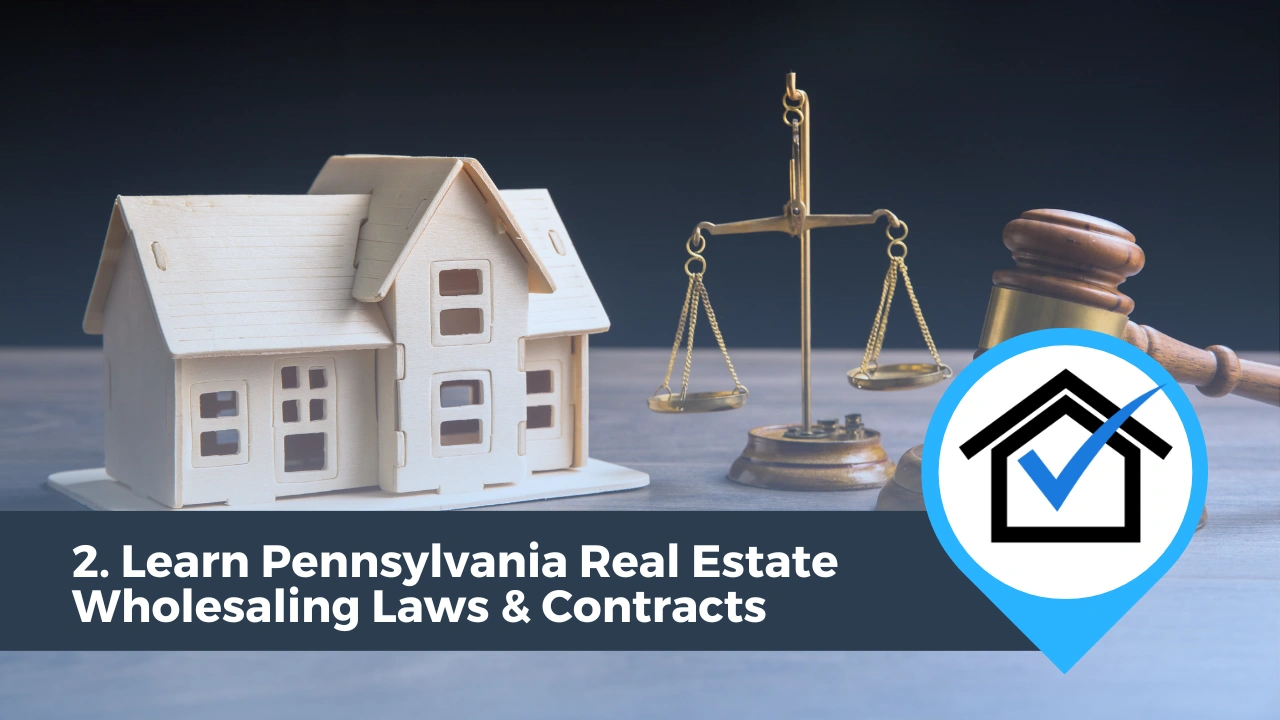
Step 2: Learn Pennsylvania Real Estate Wholesaling Laws & Contracts
States operate in different jurisdictions with different sets of laws. Texas, for example, clarified the laws about wholesaling without a license in 2017 with the passage of Senate Bill 2212.
Staying up to date on various regulations throughout Pennsylvania is essential for maintaining your wholesaling real estate business.
Philadelphia legislation broadly requires individuals who are a party to a real estate purchase, sale, or exchange to hold a valid license.
However, this legal requirement does not include those who hold an ownership interest in investment for rent or speculation. But, it does include individuals who purchase a property to simply flip it to another buyer - also known as wholesalers.
So, if you intend to own and operate a property within Philadelphia, you will likely not need a license. However, if you want to build a wholesale business, you likely will need a license unless you fall under the following criteria:
- Public official or employee acting in your official duties.
- PA-licensed attorney or real estate agent or realtor acting within the scope of your license.
- A buyer who intends to rent the property.
- An investor who buys a property and makes improvements to increase resale value.
All laws about the Philadelphia jurisdiction and obtaining a Residential Property Wholesaler License also known as the “Philadelphia Wholesaler License” can be found on the City’s website.
But, what about the rest of Pennsylvania? Is it legal to operate a wholesale business?
According to the Pennsylvania Real Estate Licensing and Registration Act, if you live outside the legal boundaries of Philadelphia and do not choose to act in ways that can be perceived as needing a real estate license then no, you do not need a license.
So, what are the actions that typically require a license?
If you (i) negotiate or aid a person in locating a property, (ii) negotiate the listing, sale, financing, or exchange of real estate, (iii) manage real estate, (iv) represent yourself as a house finder or consultant, (v) promote the sale, exchange, purchase, or rental of real estate to the exclusion of an individual whose principal business is advertising, promotion, or public relations, (vi) and perform market comparable analysis then you would need a license.
Although it sounds like wholesaling would fall in any number of the above categories, it does not. Wholesaling is selling the equitable interest in a contract collateralized by an underlying property - it is not the actual sale of the property itself. That particular loophole makes wholesaling its category within the realm of real estate - outside of the requirements of a license.
However, that is not to say that it isn’t beneficial to obtain a broker’s license in Pennsylvania. Usually, a license will give you access to a wide range of distressed properties or properties listed on exclusive websites such as the MLS or other broker networks.
Besides, Pennsylvania offers reciprocity for licensed real estate brokers and salespeople in over five different states. It might be worth it to consider getting a license even though it isn’t explicitly required to launch a wholesale business.
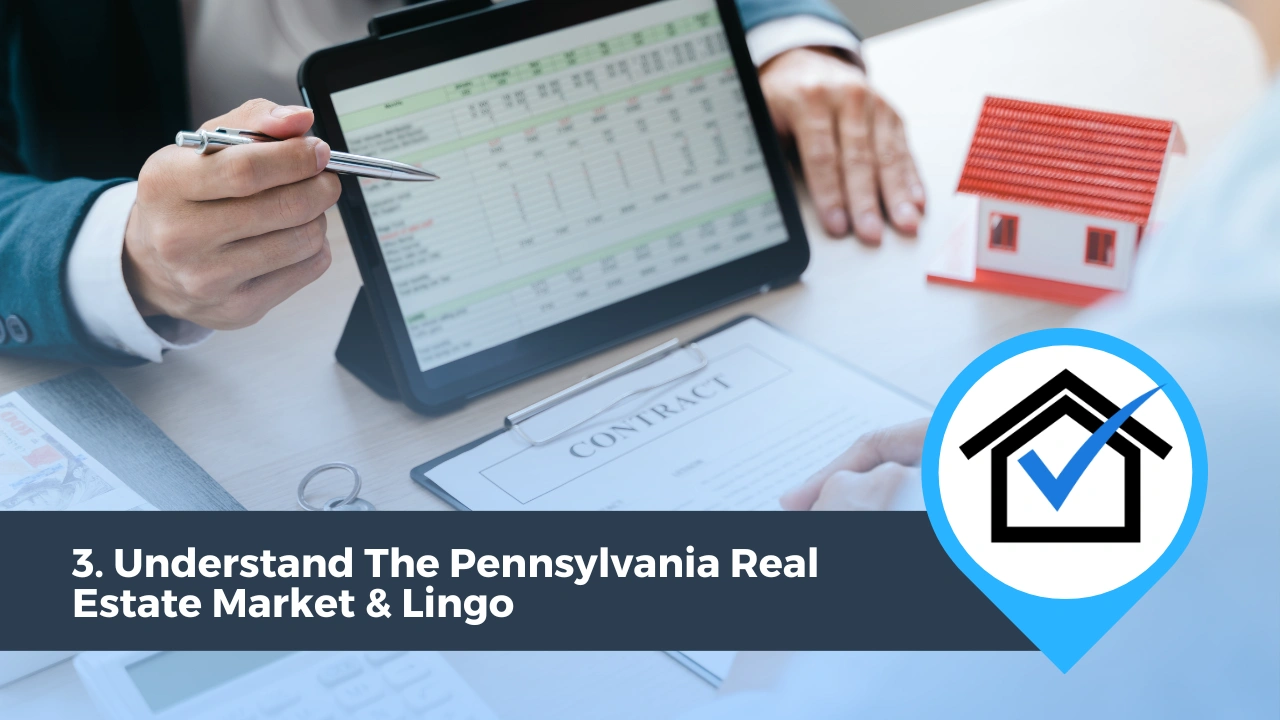
Step 3: Understand The Pennsylvania Real Estate Market & Lingo
Understanding the local lingo and verbiage is essential. When you approach sellers and potential third-party buyers, you’ll want to know the native Pennsylvania terminology. Be prepared. Be professional. And, be aware of the overall market.
Soak up all the knowledge you can about the local restaurants, housing complexes, malls, and theaters. Understand the comparable capitalization rates and typical home prices of the surrounding market. You’ll want to sound like you not only know your stuff, but you are prepared and experienced in wholesaling throughout the entire greater Pennsylvania market.
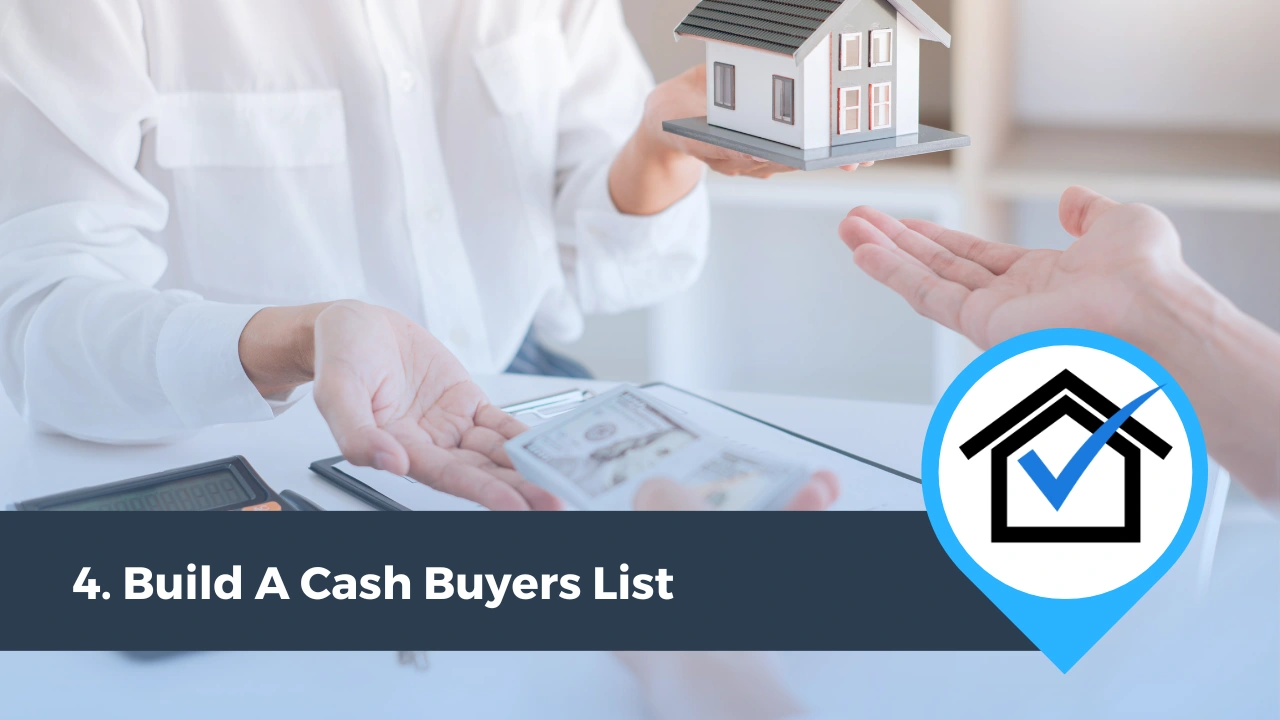
Step 4: Build A Cash Buyers List
Wholesaling is synonymous with quick, cash transactions. Most arrangements are made on distressed properties with many moving pieces. A strong wholesale transaction will typically close in a handful of days and move without any financing or inspection contingencies.
Having a pool of cash buyers can make or break a transaction. Once you are under contract, you’ll want to be able to call any number of potential buyers on your subscriber list that would be interested in a quick close.
You can also check out this quick video below that talks about how to find cash buyers online for free!
A good wholesaler has a very small window of time to get the purchase contract assigned.
That window can be anything from a few hours to a couple of weeks, but not much longer than that. Regardless, the arrangement doesn’t provide enough time to start searching for a new cash buyer to build a relationship with.
Research buyers in the Pennsylvania area and foster those relationships ahead of time. Now, when the opportunity is right, all you have to do is pick up the phone and you’ll have a buyer in no time.

Step 5: Find Motivated Sellers & Distressed Properties
Once you’ve fostered strong business partnerships and have identified a pool of cash buyers who are willing and able to dive into a property alongside you, you are ready to find the right deal.
Locating distressed properties will present investors with the most attractive rate of return. Distressed properties are often owned by motivated sellers who are willing to forgo extensive profits in exchange for a quick close.
Find the sellers. Find the distressed properties. Once you’ve done that, you are almost ready to put them in touch with your cash buyers.
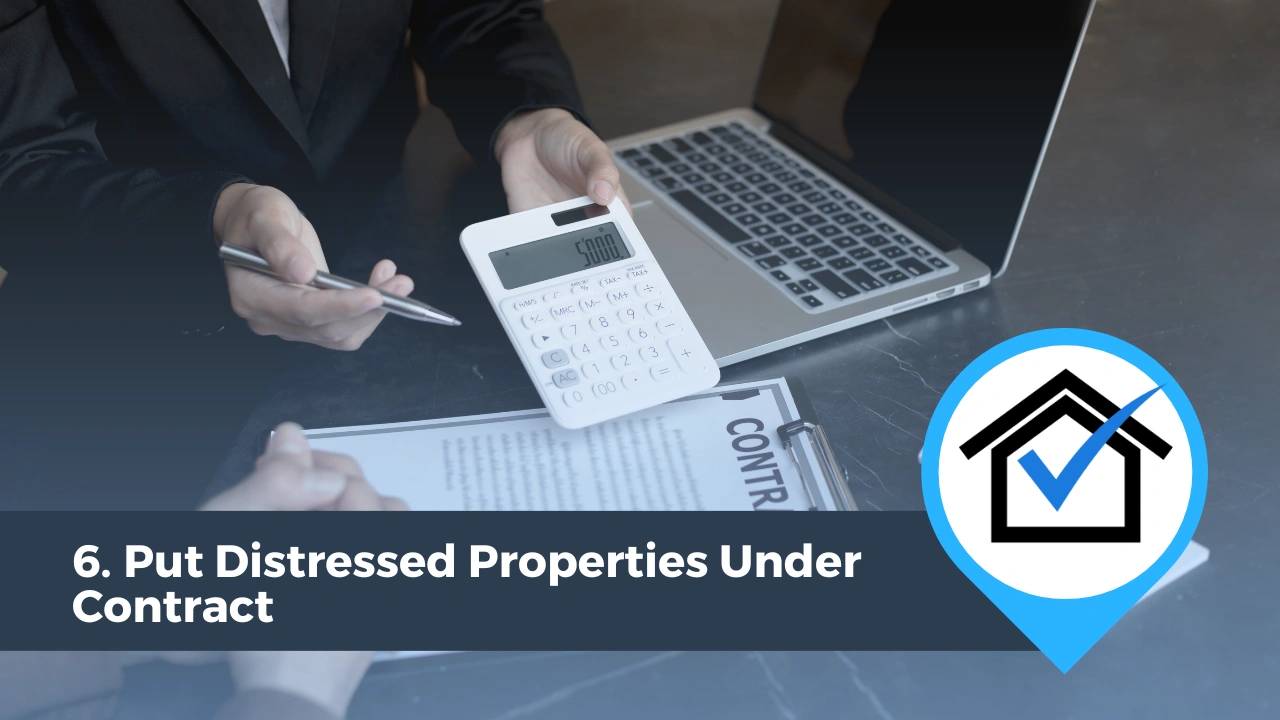
Step 6: Put Distressed Properties Under Contract
So, you’ve done your market due diligence, you’ve connected with a handful of cash buyers, and you think you see a few viable distressed properties - now what?
First, calculate the ARV - or the After Repair Value.
Second, estimate the repair costs needed to infuse into the property to attain the ARV.
Then, use the Maximum Allowable Offer formula - or the MAO formula - to determine what you can offer on the property.
Before you determine your MAO, let's look at how to lock in that property.
Watch this video to learn how to confidently fill out real estate contracts and secure your deal.
So, how are each of these steps calculated? It’s simple. Market surveying.
Determine the repair value by checking out the surrounding market to determine what an appropriate price is for a house of similar build and configuration.
Determine the repair costs by surveying market professionals and inquiring specialists and general contractors regarding cost structures and labor prices.
And lastly, determine the MAO by plugging each figure into the tried and true formula:
MAO = After Repair Value (ARV) – Renovation Costs – Desired Profit – Wholesale Fee
Then, if the distressed property purchase price falls at - or below - your MAO, make an offer fast!
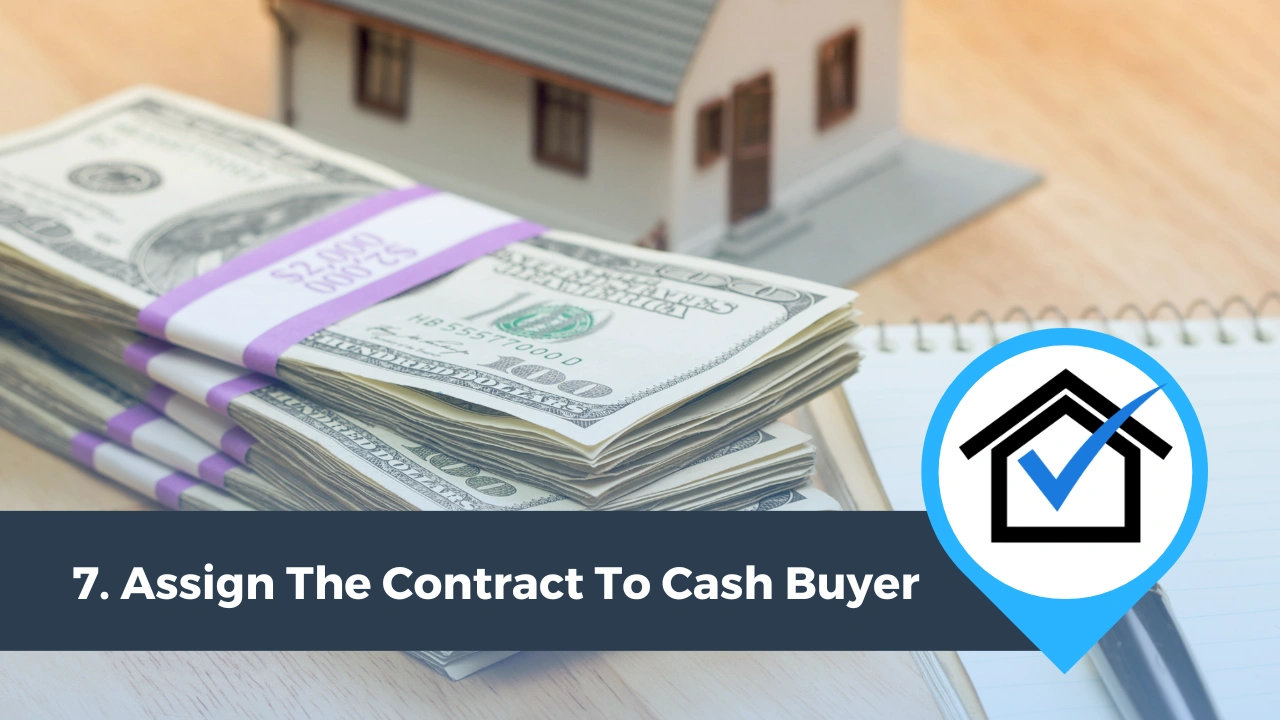
Step 7: Assign The Contract To The Cash Buyer
So you’ve secured a purchase agreement with a distressed property seller - now what?
It’s time to contact your cash buyer, agree on a wholesale fee, and assign the contract over to him or her. There are numerous templates online you could use as an assignment contract, but we recommend consulting a lawyer to ensure all variables are rock solid and in tip-top shape. The last thing you want is to draft up an incorrect assignment contract that leaves you liable for any damages or losses.
When you draft up an assignment contract don’t forget to bake in your wholesale fee!
Step 8: Close Deal And Collect Assignment Fee
Next, it’s time to close on the deal. Now that you’ve identified the cash buyer and drafted the assignment contract, all parties have to sign and complete the paperwork.
Once the assignment contract is signed, the original purchase agreement is transferred to the new buyer, and just like that, the assignment fee is yours!
Stay connected with all parties involved including the title company, real estate agents, and escrow to make sure everything is moving smoothly.
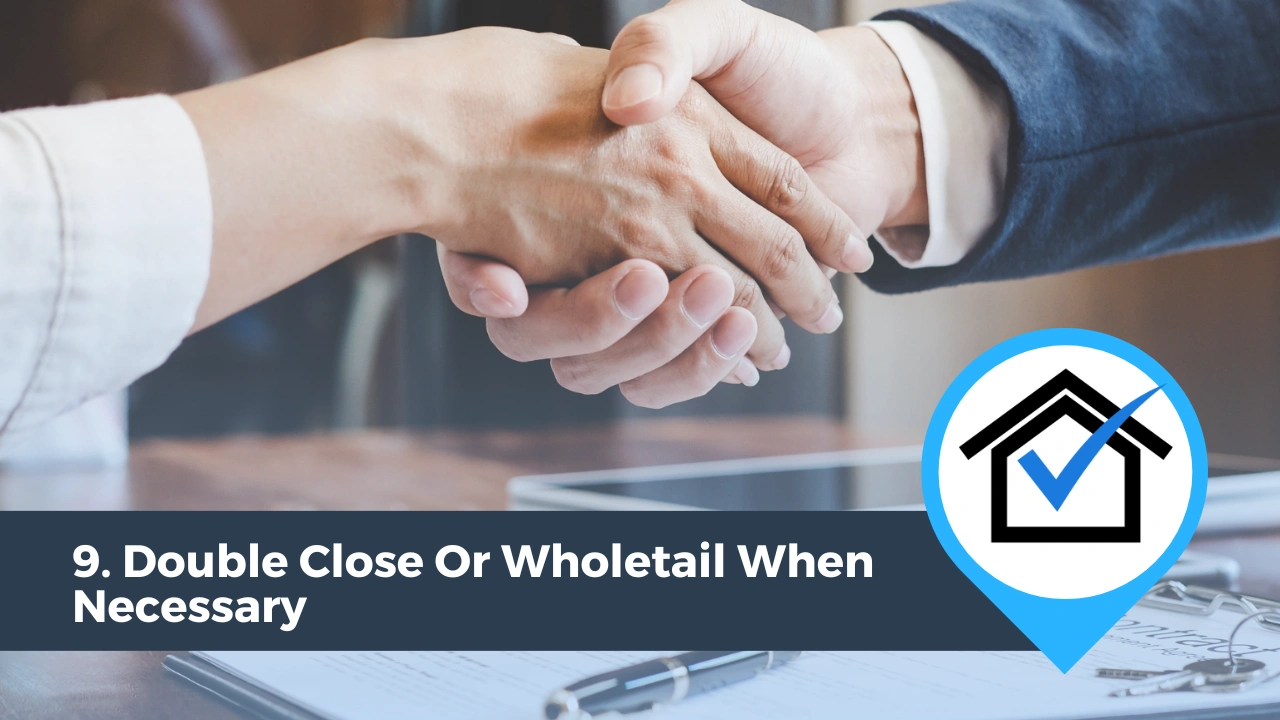
Step 9: Double Close Or Wholetail When Necessary
An alternative to the typical wholesale transaction utilizing an assignment contract is what’s known as a double close.
Double closing is a type of real estate investment strategy where two real estate transactions take place around the same time. Like traditional wholesaling, this strategy includes a property seller, a wholesaler, and an end-buyer. However, where this strategy differs is the method of closing the deal and receiving your wholesale fee.
Here’s how it works:
You, the astute wholesale investors, purchase a distressed residential, multifamily, mixed-use, or retail property at a steep discount to fair value. Then, you immediately sell the property to the ultimate buyer. The tricky part is the financing.
When structured favorably, the funding is set up so that the cash proceeds from the sale of the property to the end buyer can directly fund your purchase of the property from the original seller.
It’s almost as if the transaction is occurring in reverse. The buyer is essentially paying you before you own the property and, in turn, you send that money over to the seller minus your wholesale fee.
The strategy is a bit challenging because you have to get the title company to cooperate when using the end buyer's funds to close the first transaction with the seller. They need to be able to hold the money in escrow and facilitate the transactions to make all parties satisfied.
Alternatively, if your title company refuses to complete the funding this way, you can use a hard money lender or transactional funding to close the deal.
Also, consider wholetailing the deal for maximum exposure and profits. Luckily, these strategies are feasible in Pennsylvania and around the nation!
Read Also: Wholesaling Real Estate For Beginners
*For in-depth training on real estate investing, Real Estate Skills offers extensive courses to get you ready to make your first investment! Attend our FREE Webinar Training and gain insider knowledge, expert strategies, and essential skills to make the most of every real estate opportunity that comes your way!
Is Wholesaling Real Estate Legal In Pennsylvania?
Yes! Wholesaling in Pennsylvania is legal if you avoid violating the governing laws.
As mentioned above, laws and regulations differ in different regions of Pennsylvania. In Philadelphia, it will likely be in your best interest to get a residential wholesaler license. The requirements are challenging to maneuver and most business activities surrounding brokering, ownership, wholesaling, and flipping require a license.
However, if you reside in a different area of Pennsylvania - such as Pittsburgh, Harrisburg, Scranton, or Lancaster - you could make do without a license. That being said, it wouldn’t hurt to get one. It surely makes life a bit easier and less worrisome.
How Much Do Real Estate Wholesalers Make In Pennsylvania?
You - like many other investors - likely see the power of wholesale investing. The barriers to entry are thin, the challenges are manageable, and the learning curve is not too insurmountable. The question then becomes; how much can you possibly make?
Although it might be hard to imagine, the answer is as much as you’d like!
Many of our students who work through our online wholesaling courses and training sessions have actually managed to make over $250,000 a year.
If you can manage to infiltrate a given market through direct email marketing tactics, postcards, cold calling, and referrals, you could potentially see yourself as the premier Pennsylvania wholesaler.
Once you start closing 4-5 wholesale deals a month, you could quite literally turn into a millionaire in just a few short years.
Read Also: Wholesale Real Estate Salary: How Much Can You Make Wholesaling?
Pennsylvania Wholesale Contract: What To Expect?
A good wholesale real estate contract can make or break a deal’s success. Be sure to understand and incorporate all the Pennsylvania lingo and local regulations into your contract. A lawyer would likely be best for this. You might pay a large fee upfront, but you will surely receive dividends in the future.
Remember, a wholesale contract is a contract that allows a third party to assume your purchase contract. You are not selling the property, but rather you are selling the contract that has an underlying right to that property. Be sure to include this verbiage in all your deals to ensure all parties involved know what is going on.
Here is an example of a Pennsylvania purchase agreement. You’ll need to enter into this contract before you proceed with the wholesale agreement.
Once you’ve gone under contract, you’ll likely enter into a wholesale agreement that might look a little like this:
Keep in mind, that you’ll want to include key verbiage allowing you - the buyer - the right to transfer or sell the executed purchase agreement to any party you like. Having that option embedded in the purchase agreement gives you the flexibility to proceed with your wholesale flip.
Do You Need A Pennsylvania Wholesale License?
Except for Philadelphia, no you do not! We mean it when we say the sky's the limit. License or not, you can hit the ground running and wholesale a deal tomorrow if you present the grit and determination to see it to fruition.
Is Wholesaling In Pennsylvania Easy?
Although the barriers to entry might be small, they are still barriers. Not everyone is equipped to open a successful wholesale real estate business. The amount of time, real estate marketing, and savviness will make a difference in the success that comes your way. It isn’t easy, but it sure can be with the right tools.
Here at Real Estate Skills, we offer coaching, mentoring, and property training. Pennsylvania is a phenomenal market, and we can teach you how to master it. Check out our articles and programs - especially the Pro Wholesaler VIP Program. You, like many before you, can become extremely successful in no time!
Final Thoughts On Wholesaling In Pennsylvania
Pennsylvania is the perfect market for wholesale investing. With the right mentorship, education, and determination you can become one of the greatest in the state.
Understand your local laws, navigate the licensing requirements, and believe in yourself. With the proper training and guidance on how to invest in real estate in Pennsylvania, you can become a notable real estate investor with loads of success.
All it takes is one deal to get the ball rolling. Good luck!
If you’re serious about doing your first real estate deal, don’t waste time guessing what works. Our FREE Training walks you through how to consistently find deals, flip houses, and build passive income—without expensive marketing or trial and error.
This FREE Training gives you the same system our students use to start fast and scale smart. Watch it today—so you can stop wondering and start closing.
*Disclosure: Real Estate Skills is not a law firm, and the information contained here does not constitute legal advice. You should consult with an attorney before making any legal conclusions. The information presented here is educational in nature. All investments involve risks, and the past performance of an investment, industry, sector, and/or market does not guarantee future returns or results. Investors are responsible for any investment decision they make. Such decisions should be based on an evaluation of their financial situation, investment objectives, risk tolerance, and liquidity needs.

